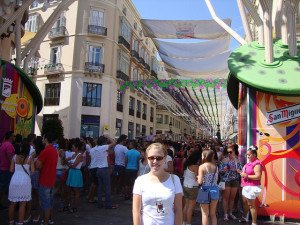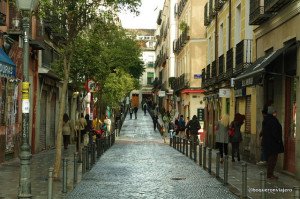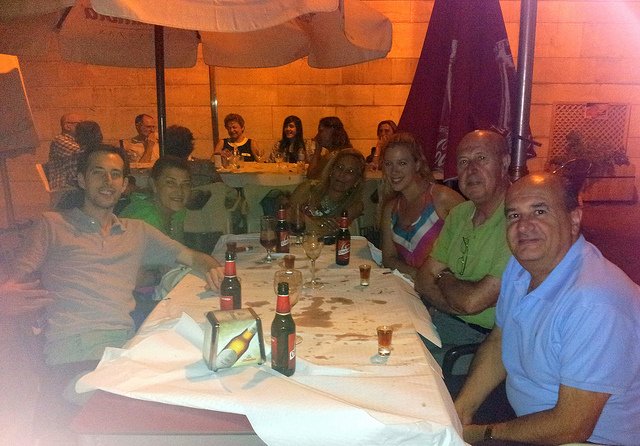A cross cultural debate between Pedro and Abby defending the other person’s country
Today we are publishing one of our most special articles to date. We wanted to talk honestly about the other person’s country from a totally emotional, subjective and general point of view. Pedro is from Málaga (Andalucía, Spain) and Abby is from Reading (PA, United States) Both of us have lived in Madrid, Barcelona, Andalucía and New York.
Food
 Abby: The food in Spain is definitely one of the things I miss most about living in Madrid. The culture of tapas and having delicious little bites with a beer or a glass of wine in a corner bar with your friends is something that is hard to find in the States, and something quintessentially Spanish. The food in Spain tends to be classic (why mess with something that is already so tasty?) Spanish omlette, Manchego cheese, gazpacho, grilled octopus with potatoes, or even a stew like the “cocido madrileño.” Spaniards love to eat and make time to share a meal or a bite with friends. The whole idea of slowing down and enjoying your food is something often lost in the hurried day to day of New York City.
Abby: The food in Spain is definitely one of the things I miss most about living in Madrid. The culture of tapas and having delicious little bites with a beer or a glass of wine in a corner bar with your friends is something that is hard to find in the States, and something quintessentially Spanish. The food in Spain tends to be classic (why mess with something that is already so tasty?) Spanish omlette, Manchego cheese, gazpacho, grilled octopus with potatoes, or even a stew like the “cocido madrileño.” Spaniards love to eat and make time to share a meal or a bite with friends. The whole idea of slowing down and enjoying your food is something often lost in the hurried day to day of New York City.
 Pedro: To tell the truth, when I arrived in the United States, I was a little bit nervous about everything people had told me about the food. The reality is a bit different (although not much). The American, in general (because things are beginning to change,) does not know how to eat well, and doesn’t know a lot about eating healthy. They don’t see the love in preparing food and the importance of enjoying the moment, because a good meal can be a gift to yourself and others. Of course, in New York there are a multitude of foods, things move so fast, and there are all kinds of delicious smells in the street, so it makes it hard not to eat something in a restaurant or order in. The positive side of all this is that you can try a variety of dishes that in Spain I had never even heard of, and I like a lot!
Pedro: To tell the truth, when I arrived in the United States, I was a little bit nervous about everything people had told me about the food. The reality is a bit different (although not much). The American, in general (because things are beginning to change,) does not know how to eat well, and doesn’t know a lot about eating healthy. They don’t see the love in preparing food and the importance of enjoying the moment, because a good meal can be a gift to yourself and others. Of course, in New York there are a multitude of foods, things move so fast, and there are all kinds of delicious smells in the street, so it makes it hard not to eat something in a restaurant or order in. The positive side of all this is that you can try a variety of dishes that in Spain I had never even heard of, and I like a lot!
Work
 Abby: In Spain there is a concept of working to live, rather than living to work. This concept is often the back bone of arguments against America. I think that while it is true that Americans work very hard, we also play hard. One thing I miss, however, on a daily basis is the time we had for a coffee break in the morning, and a longer lunchtime. In Spain the idea that you cannot just plough on through seems to be more accepted. I think some of the best ideas I had at work came out of informal conversations around the coffee machine (and some of the best laughs, too!) The longer lunch gave me time to finish up something if I needed to, or to refocus if my morning was too stressful. The weekend, also, was reserved for your family. Something that does not always happen in the United States.
Abby: In Spain there is a concept of working to live, rather than living to work. This concept is often the back bone of arguments against America. I think that while it is true that Americans work very hard, we also play hard. One thing I miss, however, on a daily basis is the time we had for a coffee break in the morning, and a longer lunchtime. In Spain the idea that you cannot just plough on through seems to be more accepted. I think some of the best ideas I had at work came out of informal conversations around the coffee machine (and some of the best laughs, too!) The longer lunch gave me time to finish up something if I needed to, or to refocus if my morning was too stressful. The weekend, also, was reserved for your family. Something that does not always happen in the United States.
 Pedro: This might be one of the more delicate and interesting topics when comparing the two countries. For me, the United States, specifically New York, is the land of opportunities. Things move very fast, and the concept of working to live is not valued as much, but you can dedicate yourself to what you really like and feel like you are growing professionally. I think that you can find a balance between work and home life, you just have to make more of an effort. Overall, what I’m impressed with in this country is how easy it is to start and develop a new project. At this point in my life, and after having worked in both countries, I can say that I prefer the United States to be able to develop my professional projects.
Pedro: This might be one of the more delicate and interesting topics when comparing the two countries. For me, the United States, specifically New York, is the land of opportunities. Things move very fast, and the concept of working to live is not valued as much, but you can dedicate yourself to what you really like and feel like you are growing professionally. I think that you can find a balance between work and home life, you just have to make more of an effort. Overall, what I’m impressed with in this country is how easy it is to start and develop a new project. At this point in my life, and after having worked in both countries, I can say that I prefer the United States to be able to develop my professional projects.
Quality of Life
 Abby: I think this is an area where Spain wins hands down. The beautiful weather, gorgeous beaches, beautiful mountains, and numerous national holidays are a huge plus. In addition, Spaniards are awarded more time for maternity leave, have social security (which for however well it functions, is a step up from our own struggles with health care in the United States). Spaniards also tend to take their work with a grain of salt, not being so tethered to the office, making the most of their leisure time and focusing on family and friends.
Abby: I think this is an area where Spain wins hands down. The beautiful weather, gorgeous beaches, beautiful mountains, and numerous national holidays are a huge plus. In addition, Spaniards are awarded more time for maternity leave, have social security (which for however well it functions, is a step up from our own struggles with health care in the United States). Spaniards also tend to take their work with a grain of salt, not being so tethered to the office, making the most of their leisure time and focusing on family and friends.
 Pedro: I think that in general, people think that in the United States there is not much quality of life. There are tons of professional opportunities, which will later allow you to find balance and a better quality of life. I think the American is beginning to realize that living life and being happy is more important. I think in our case, the conditions have made it clear that our quality of life has improved, and we’ve set higher expectations since living in the United States.
Pedro: I think that in general, people think that in the United States there is not much quality of life. There are tons of professional opportunities, which will later allow you to find balance and a better quality of life. I think the American is beginning to realize that living life and being happy is more important. I think in our case, the conditions have made it clear that our quality of life has improved, and we’ve set higher expectations since living in the United States.
Going Out
 Abby: I’m not sure if you are all familiar with the April Fair in Seville, or Carnival in Cádiz, but these famous fiestas are just part of the general culture in Spain. Spaniards like to have a good time, and with all those sunny days, great wines and local beers, who can blame them? There is literally a bar on every corner in Spain, every town has it’s own local fair and social life mainly happens outside the home. Why not meet a friend for a beer? In all the big cities, night life is a major attraction, and even in small towns, the local bars often start playing music in a type of impromptu club. Americans have clubs and go out, but it doesn’t hold a candle to the party atmosphere in Spain. ¡Olé!
Abby: I’m not sure if you are all familiar with the April Fair in Seville, or Carnival in Cádiz, but these famous fiestas are just part of the general culture in Spain. Spaniards like to have a good time, and with all those sunny days, great wines and local beers, who can blame them? There is literally a bar on every corner in Spain, every town has it’s own local fair and social life mainly happens outside the home. Why not meet a friend for a beer? In all the big cities, night life is a major attraction, and even in small towns, the local bars often start playing music in a type of impromptu club. Americans have clubs and go out, but it doesn’t hold a candle to the party atmosphere in Spain. ¡Olé!
 Pedro: Here there is no argument. I miss the concept of going out in Spain. In the United States, parties are for special occasions and you have to plan too far in advance. In Spain, things are much more improvised and the night life is much more fun. In my opinion there are lots of options in every city. Going out in New York is very expensive and I miss the combination of going out for some beers and then to dance. It’s true, however, that in barbeques and group parties are much more normal and you definitely have a great time.
Pedro: Here there is no argument. I miss the concept of going out in Spain. In the United States, parties are for special occasions and you have to plan too far in advance. In Spain, things are much more improvised and the night life is much more fun. In my opinion there are lots of options in every city. Going out in New York is very expensive and I miss the combination of going out for some beers and then to dance. It’s true, however, that in barbeques and group parties are much more normal and you definitely have a great time.
The “siesta”
Abby: It’s true that the siesta is slowly falling by the wayside in Spain. Many businesses are beginning to remain open in the afternoon, and as air conditioning becomes more common, even the sweltering sun of a summer day in Seville becomes more bearable. The siesta began as a necessity of life in the summer months. With temperatures that regularly reach 100 degrees F, it’s logical that a person couldn’t be expected to eat lunch and then get right back to work. I love a good siesta if I’m on vacation, and I think the idea of resting after lunch, staying home and watching a movie is perhaps the best way to spend a lazy Sunday!
Pedro: I think this concept has become associated with Spain forever. The truth is that during the summer and on holidays, it’s normal to have a siesta in Spain. Here the idea of wasting time for a nap is absurd, because you can sleep at night and after lunch you should keep doing things. I think the difference also lies in that lunch in the United States is usually lighter, because no one is going to go back to work after eating a heavy Spanish stew!
Patriotism
 Abby: As an American living in Spain, it always seemed strange to me that patriotism was so political. I grew up in America where being patriotic was something associated with the 4th of July, cook outs and wearing red white and blue. In Spain the concept of being patriotic is much more politically charged. It’s hard to find people wearing national colors for anything besides a World Cup soccer match. I think it’s a bit sad that patriotism has gotten looped up in the conservative party. There is a lot to be proud of in Spain, a rich cultural history, delicious food, and a spirit of family loyalty that crosses politically boundaries.
Abby: As an American living in Spain, it always seemed strange to me that patriotism was so political. I grew up in America where being patriotic was something associated with the 4th of July, cook outs and wearing red white and blue. In Spain the concept of being patriotic is much more politically charged. It’s hard to find people wearing national colors for anything besides a World Cup soccer match. I think it’s a bit sad that patriotism has gotten looped up in the conservative party. There is a lot to be proud of in Spain, a rich cultural history, delicious food, and a spirit of family loyalty that crosses politically boundaries.
 Pedro: My concept of patriotism has changed drastically since I arrived in the United States. In Spain, since I was l ittle, it was taboo to be patriotic, it was something that put you in a political box. In the United States it is different, they are proud to be American (regardless of political party) and they defend their country. I think this is partly due to the way the country was founded, with people from so many different cultures, that the commonality of being american brought them together. Here, you can be doubly proud: of your country of origin, as well as of your new home, and that’s exactly how I feel.
Pedro: My concept of patriotism has changed drastically since I arrived in the United States. In Spain, since I was l ittle, it was taboo to be patriotic, it was something that put you in a political box. In the United States it is different, they are proud to be American (regardless of political party) and they defend their country. I think this is partly due to the way the country was founded, with people from so many different cultures, that the commonality of being american brought them together. Here, you can be doubly proud: of your country of origin, as well as of your new home, and that’s exactly how I feel.
Sports
 Abby: There is absolutely nothing better after a long day at work than going to a tiny bar in Spain to watch a soccer match. Soccer fans are extreme, and love to show off their team pride by wearing the team colors, going to the “peña” or bar for team supporters, and shouting GOOOOOOOOOOOOL at the top of their lungs. There is something about this experience, complete with tapas, shouting at the guy behind the bar to bring you another beer, and the immediate friendship with anyone who is rooting for the same team. ¡Forza Málaga! y ¡Hala Madrid!
Abby: There is absolutely nothing better after a long day at work than going to a tiny bar in Spain to watch a soccer match. Soccer fans are extreme, and love to show off their team pride by wearing the team colors, going to the “peña” or bar for team supporters, and shouting GOOOOOOOOOOOOL at the top of their lungs. There is something about this experience, complete with tapas, shouting at the guy behind the bar to bring you another beer, and the immediate friendship with anyone who is rooting for the same team. ¡Forza Málaga! y ¡Hala Madrid!
 Pedro: Here being a sports fan is very different not only because people follow different sports, but also because of the way people watch them. To start with, people are almost more dedicated to their college sports team than the professional teams. The university you go to is part of your identity and you go to the stadium to cheer on your team in the same way that I went to cheer on the Málaga professional soccer team in Spain. Then, the sports teams are always the same. There is no chance that your favorite team could drop down to second division, and people tend to be fans of the team from the city where they are from originally, not the city where they live. Lastly, watching a game without a beer and fast food? Are you kidding?!? hahaha!
Pedro: Here being a sports fan is very different not only because people follow different sports, but also because of the way people watch them. To start with, people are almost more dedicated to their college sports team than the professional teams. The university you go to is part of your identity and you go to the stadium to cheer on your team in the same way that I went to cheer on the Málaga professional soccer team in Spain. Then, the sports teams are always the same. There is no chance that your favorite team could drop down to second division, and people tend to be fans of the team from the city where they are from originally, not the city where they live. Lastly, watching a game without a beer and fast food? Are you kidding?!? hahaha!
The “sobremesa”
Abby: This is a concept that does not even have an English translation. This word means that time you spend chatting with friends and family after a meal. This might be accompanied by a drink, and often is a time for conversation and laughter. I think in America, it is less common to linger in general, and I miss the relaxed nature of having a meal with family. This is an afternoon affair that places emphasis on enjoying the moment and the company. Who can argue with that?
Pedro: Here they have taken away one of my most valued cultural concepts. I am happy as a child during the “sobremesa” and enjoy talking with a full stomach, my coffee and maybe a glass of brandy is something I associate with a Sunday afternoon. Here the thought process seems to be that if you have finished eating, why sit around if there are other things to do?
The uniqueness of the places
 Abby: Here I have to say that Spain wins for me hands down. I miss the little cobblestone streets, the historic buildings, and the beautiful blue skies of Andalucia. The gorgeous narrow streets with the mom and pop shops and the restaurants that have been around for years around the plaza Mayor are so much more interesting to me than an American small town. Perhaps this is a case of “the grass is always greener,” but I love wandering around even the smallest village in Spain, watching the locals and getting lost in the little side streets.
Abby: Here I have to say that Spain wins for me hands down. I miss the little cobblestone streets, the historic buildings, and the beautiful blue skies of Andalucia. The gorgeous narrow streets with the mom and pop shops and the restaurants that have been around for years around the plaza Mayor are so much more interesting to me than an American small town. Perhaps this is a case of “the grass is always greener,” but I love wandering around even the smallest village in Spain, watching the locals and getting lost in the little side streets.
 Pedro: This is a topic that seems very subjective. I think that every place is charming and unique in a different way. I love to travel and visit new places in the United States. I know I won’t find a cathedral from the fifteenth century, or cobblestone streets, but there are other ways of being charming. I like to visit cities, meet the people, learn about the history and the emblematic places that make the city different. I like to visit the towns in the United States and see the different colors in nature here. This isn’t a comparison, but rather a defense of the fact that every place has their own charm in it’s own way.
Pedro: This is a topic that seems very subjective. I think that every place is charming and unique in a different way. I love to travel and visit new places in the United States. I know I won’t find a cathedral from the fifteenth century, or cobblestone streets, but there are other ways of being charming. I like to visit cities, meet the people, learn about the history and the emblematic places that make the city different. I like to visit the towns in the United States and see the different colors in nature here. This isn’t a comparison, but rather a defense of the fact that every place has their own charm in it’s own way.









As an American who lived 30 years in Spain, I think it´s hard to compare countries. Each has unique elements-cultural, historical, geographical- that are non-transferable. Having said that, there are some things that both countries could teach each other. USA to SPAIN: A political system that facilitates entrepreneurs would make life in Spain almost perfect. The present system stifles initiative and keeps unemployment high. SPAIN to USA: A national health plan. Health care should not be based on the profit motive, it should be a basic right. Nobody should be driven to poverty by a catastrophic illness. This is one thing I miss about Spain. America is no place to get sick.
As a Spaniard who currently lives in America, I can agree to all of these. I really miss Spain during the schoolyear and during the Summer I go to Spain and relax at the beach and have fun with my friends there.
Thank you so much for writing this! I am American and my husband is Spanish. We lived in Spain until just last year. I MISS Spain so much. I feel like our lives have sped up so much and we have no time to enjoy and relax. He works all the time. If my family lived in Spain I would go back in a heartbeat.
Hello, thank you for sharing your experiences. I have plans top come to Spain from Los Angeles. I plan on a long stay. Could you please tell me where is the best place you think for an American to reside and enjoy. I am single and I am social and friendly.
Thank You